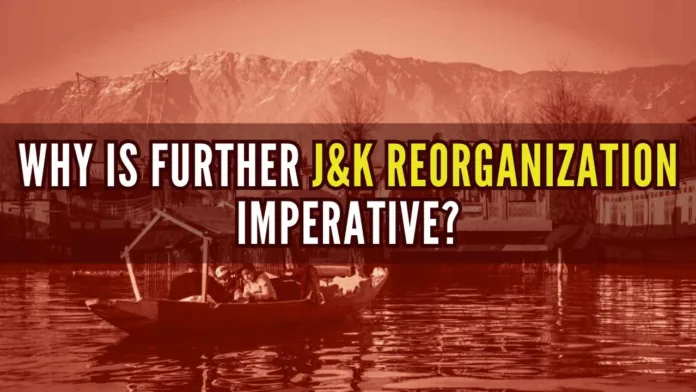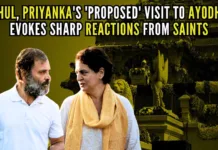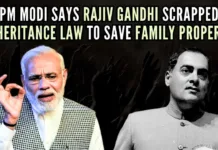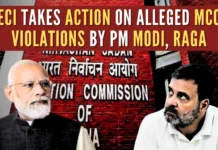
Common thing
One thing that’s common among the Kashmir-based and Jammu-based political parties is that their support base is primarily limited to the regions to which they belong and yet they insist 24X7 that the J&K UT must be maintained as one political unit. Yet another common thing among them is that all these parties ignore, or willfully overlook the otherwise highly hostile attitude of the electorate located in different regions towards them. The major parties are the Jammu and Ladakh-based Bharatiya Janata Party (BJP), the Kashmir-based National Conference (NC), and the Kashmiri-dominated but Jammu-based Congress with some support-base in the Cold-Desert Ladakh, and some of the marginal outfits include the Valley-based Peoples Democratic Party (PDP) and the Peoples Conference (PP).
Political status of political parties
National Conference
The Kashmir’s premier religio-political outfit and votary of greater autonomy, bordering on sovereignty, the NC, did not contest the general elections in Jammu province in 2014 and 2019 and the NC’s vice-president and former J&K CM Omar Abdullah has made it loud and clear that his party would not contest the 2024 general elections in Jammu and Ladakh. “
“We would be only discussing those seats which are presently held by the BJP. There are only six seats (five in J&K UT and one in Ladakh). Three seats – Srinagar, Baramulla, and Anantnag — are anyway held by NC. So we are only discussing three seats – Jammu, Udhampur, and Ladakh. So I do not think it will be too difficult…The Congress-led I.N.D.I. bloc was formed to reduce the seats of BJP and not of its own alliance partners (in this case NC) in the upcoming Lok Sabha elections…The party will not ‘surrender’ any of the three seats in Kashmir that it won in the last general election,” said Omar Abdullah. He made these unambiguous statements on February 27 while talking to news agency, PTI.
The NC had entered into a pre-poll alliance with the Congress in 2014 and 2019 and left Jammu’s two Lok Sabha seats for the Congress. It is clear that the NC would again stitch a pre-poll alliance with the Congress and leave three seats – Jammu, Kathua-Udhampur, and Doda and Ladakh – for the Congress.
The NC had suffered an ignominious defeat at the hands of the newly-founded PDP of the Muftis in 2014. So much so, that the three-time J&K CM and proprietor of the NC, Farooq Abdullah, had to bite the dust in 2014 in the Srinagar Lok Sabha constituency. In 2019, it did turn the tables on the PDP in all three Kashmir Lok Sabha seats but could get only a paltry 7.9 percent of the total votes polled in J&K and Ladakh. Such was its bad performance even in Kashmir in 2019. It should establish that the NC, which dominated the state’s political scene for decades after 1932 and ruled or misruled the state for almost 35 years between 1947 and 2014, has lost much of its sheen and appeal even among the followers of one particular religion and one particular religious sect.
Why doesn’t the NC muster the courage to test political waters in Jammu province and Ladakh? The reasons are not really difficult to fathom. One of the reasons is that the overwhelming Hindu-majority Jammu province and Ladakh, where the Buddhists constitute 40 percent and Hindus form 12 percent (total 52 percent) of the total population, hate and despise the politics, NC-style. Remember, Shiite Muslims constitute only less than 46 percent population in Ladakh and they are mostly found in Kargil tehsil.
Congress
What is the political status of the Congress in Jammu, Kashmir, and Ladakh – The Congress which ruled the state between 1965 and 1957 on its own strength and shared power with the NC for a little over eight years and shared power with the PDP between November 2005 and July 2008? It didn’t win even a single Hindu-majority seat out of nearly 30 in Jammu province in the 2014 Assembly elections and it suffered humiliating defeats in Jammu province and Ladakh in the 2014 and 2019 general elections. It suffered humiliating defeats both in the Assembly and Lok Sabha elections because of its alliance with the pro-autonomy and essentially anti-Jammu and anti-Ladakh NC and the pro-self-rule and pro-supra-state measures PDP, also called TDP (two-district (Anantnag and Pulwama) party. To be more precise, it lost the elections miserably because it had, and has, become extremely difficult to distinguish between the NC/ PDP and the Congress. So much so, that in 2019, it merged its identity with the Farooq Abdullah and Mehbooba Mufti-led Gupkar group of pro-370 Articles. Reports suggest that the Congress will field its candidates in the Jammu province’s two Lok Sabha constituencies and Ladakh constituency.
BJP
The story of the BJP is very interesting. Till 2013, it was termed as a party of “Kanak Mandi and Raghunath Bazar with City Chowk and Kachi Chowni as its main areas of action, or activities”. That it was just a marginal outfit even in Jammu could be seen from the fact that it could win only the Nagrota Assembly seat in 2002 by a narrow margin of less than 60 votes. It was the rise of Narendra Modi in 2013-2014 that led to the phenomenal rise of the BJP not just in Jammu province but also in Ladakh. In the April-May 2014 general elections, the BJP created a history of sorts by winning with a huge margin all three Lok Sabha seats in Jammu province and the Trans-Himalayan Ladakh. It again created a history of sorts in the November-December 2014 Assembly elections by winning as many as 25 out of 37 seats in Jammu province. It could have won 28 had it managed things properly in Nagrota, Udhampur, and Bishnah. The BJP yet again created history by repeating its 2014 performance in the general elections in 2019 and this time it got a whopping 46.7 percent of the total votes polled – almost 40 percent more than the NC, 20 percent more than the Congress, and over 44 percent more than the PDP, which had become thoroughly unpopular across the state for reasons not really difficult to fathom. The reasons were the same which had led to the great fall of the NC from 57 in 1996 to just 15 in 2014.
Significantly, the BJP, which repeatedly claimed that the number of its members in Kashmir Valley is “over 5 lakh”, could never win even a single assembly seat in the Valley. Leave aside its rather poor performance in all the general elections in Kashmir. The truth is that all its candidates would again and again forfeit their security deposit both in the general elections and in the Assembly polls. It could never get more than 60,000 votes, which also included the votes of the persecuted and hounded-out Kashmiri Hindus. Why’s the BJP’s performance in Kashmir so dismal? Why because Kashmir hates and despises the BJP’s pro-integration ideology. And there should be no doubt about it.
PDP and PC
As said the PDP, which was formed in 1999 and which also created history by winning 16 Assembly seats in 2002 for the first time after its formation and 28 in 2014 and which was responsible for the fractured verdicts in Kashmir in 2002, 2008, and 2014 and also responsible for the fall of the NC and the Congress in Kashmir, lost all its sheen and appeal after Prime Minister Modi and his BJP brought down the Mehbooba Mufti-led PDP-BJP coalition government on the ground that it was terrorist-friendly and anti-Jammu and anti-Ladakh. That’s the reason both the NC and the Congress have not been taking the PDP seriously ignoring the fact that the PDP, like the NC and the Congress, are also part of the I.N.D.I. Alliance. There are reasons to believe that the outraged and sidelined PDP may contest from Rajouri-Anantnag and Baramulla or Srinagar Lok Sabha seats. It will not contest in any of the two Jammu Lok Sabha seats.
As for the PC, the less said the better. It is not even Kashmir-based; its support base, whatever it is, is basically confined to certain areas in the Kupwara-Handwara belt. It has perhaps contested elections in Jammu province’s Samba and Kathua assembly segments only once – in 1996 – and both the (Hindu) candidates lost their security deposits. This happened when Abdul Gani Lone was chief of the PC. In fact, it was he who founded the PC and also became MoS in Education. At present, the party is headed by Sajad Lone, whose party won two seats in the 2014 Assembly elections and became Cabinet Minister in the PDP-led coalition government out of the BJP’s quota. Sajad Lone has come out with a book, titled “Achievable Nationhood”. And, he only on February 26, 2024, declared that he would contest the Lok Sabha election from Baramulla. But more than that, he made it clear that the “PC would not contest any seat in the Jammu region of the Union Territory” (India Today, Feb 26, 2024).
Maintaining J&K UT as one political unit impractical
What does all this suggest? It suggests that the NC, the PDP, and the PC are mortally afraid of Jammu province because of its demographic profile and its intense pro-Bharat ideology. The Congress has no other option but to again test political waters in Jammu province and Ladakh taking into account their demographic profiles and despite the fact that its poll prospectus in Jammu are not really bright. The BJP is the only party that has, according to reports, decided to field its candidate in all the six Lok Sabha constituencies – five in J&K UT and one in Ladakh UT – knowing it full well that its fate in 2024 would be no different from what it met in the earlier Assembly and Lok Sabha elections.
The moral of the story is that there is nothing whatsoever common between Jammu province and the Kashmir region and that while the bulk of the people of Jammu province look down upon the Kashmiri parties, the people of Kashmir look down upon the BJP. And, to maintain the J&K UT as a single political unit would be only to further embitter the already rather bitter relations between the two. The statesmanship demands further reorganization of the UT. Such a reorganization will help not just South and North Blocks effectively tackle the problem in Kashmir but would also empower the disempowered Jammu province and help promote politics in Kashmir based on democratic and economic issues. Jammu Vs Kashmir never helped New Delhi and these two regions in the past. Nor would it help them in the future.
Note:
1. Text in Blue points to additional data on the topic.
2. The views expressed here are those of the author and do not necessarily represent or reflect the views of PGurus.
For all the latest updates, download PGurus App.
- ‘Kashmir My core constituency’: Revisiting July 12, 2003 to understand politics, Omar Abdullah-style - March 15, 2024
- Total deviation from traditional approach: Seven takeaways from PM Modi’s March 7 Srinagar visit - March 9, 2024
- Status of political parties: Why is further J&K reorganization imperative? - March 1, 2024










